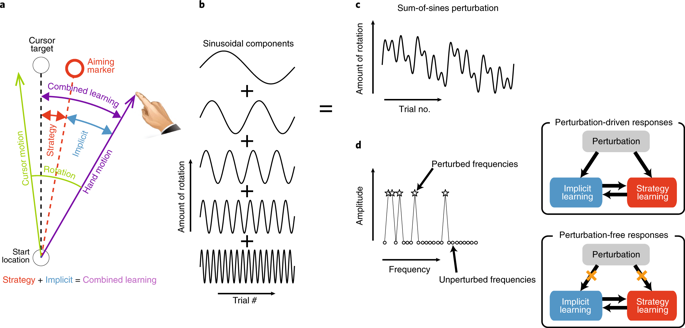当前位置:
X-MOL 学术
›
Nat. Neurosci.
›
论文详情
Our official English website, www.x-mol.net, welcomes your feedback! (Note: you will need to create a separate account there.)
Implicit adaptation compensates for erratic explicit strategy in human motor learning.
Nature Neuroscience ( IF 25.0 ) Pub Date : 2020-02-28 , DOI: 10.1038/s41593-020-0600-3 Yohsuke R Miyamoto 1 , Shengxin Wang 2 , Maurice A Smith 1, 3
Nature Neuroscience ( IF 25.0 ) Pub Date : 2020-02-28 , DOI: 10.1038/s41593-020-0600-3 Yohsuke R Miyamoto 1 , Shengxin Wang 2 , Maurice A Smith 1, 3
Affiliation

|
Sports are replete with strategies, yet coaching lore often emphasizes 'quieting the mind', 'trusting the body' and 'avoiding overthinking' in referring to the importance of relying less on high-level explicit strategies in favor of low-level implicit motor learning. We investigated the interactions between explicit strategy and implicit motor adaptation by designing a sensorimotor learning paradigm that drives adaptive changes in some dimensions but not others. We find that strategy and implicit adaptation synergize in driven dimensions, but effectively cancel each other in undriven dimensions. Independent analyses-based on time lags, the correlational structure in the data and computational modeling-demonstrate that this cancellation occurs because implicit adaptation effectively compensates for noise in explicit strategy rather than the converse, acting to clean up the motor noise resulting from low-fidelity explicit strategy during motor learning. These results provide new insight into why implicit learning increasingly takes over from explicit strategy as skill learning proceeds.
中文翻译:

隐式适应可以补偿人类运动学习中不稳定的显式策略。
体育中充斥着各种策略,但教练绝杀常常强调“安静的头脑”,“信任身体”和“避免过度思考”,因为这是指少依赖高级显式策略以支持低级隐式运动学习的重要性。我们通过设计在某些方面而非其他方面驱动适应性变化的感觉运动学习范式,研究了显式策略与隐式运动适应之间的相互作用。我们发现,策略和隐式适应在驱动维度上是协同的,但在非驱动维度上可以有效地相互抵消。独立分析-基于时滞,数据和计算建模中的相关结构表明,这种取消之所以发生,是因为隐式自适应有效地补偿了显式策略中的噪声而不是相反,从而消除了运动学习过程中由低保真显式策略引起的电动机噪声。这些结果提供了新的见解,说明了随着技能学习的进行,内隐学习为何逐渐取代外显策略。
更新日期:2020-02-28
中文翻译:

隐式适应可以补偿人类运动学习中不稳定的显式策略。
体育中充斥着各种策略,但教练绝杀常常强调“安静的头脑”,“信任身体”和“避免过度思考”,因为这是指少依赖高级显式策略以支持低级隐式运动学习的重要性。我们通过设计在某些方面而非其他方面驱动适应性变化的感觉运动学习范式,研究了显式策略与隐式运动适应之间的相互作用。我们发现,策略和隐式适应在驱动维度上是协同的,但在非驱动维度上可以有效地相互抵消。独立分析-基于时滞,数据和计算建模中的相关结构表明,这种取消之所以发生,是因为隐式自适应有效地补偿了显式策略中的噪声而不是相反,从而消除了运动学习过程中由低保真显式策略引起的电动机噪声。这些结果提供了新的见解,说明了随着技能学习的进行,内隐学习为何逐渐取代外显策略。



























 京公网安备 11010802027423号
京公网安备 11010802027423号